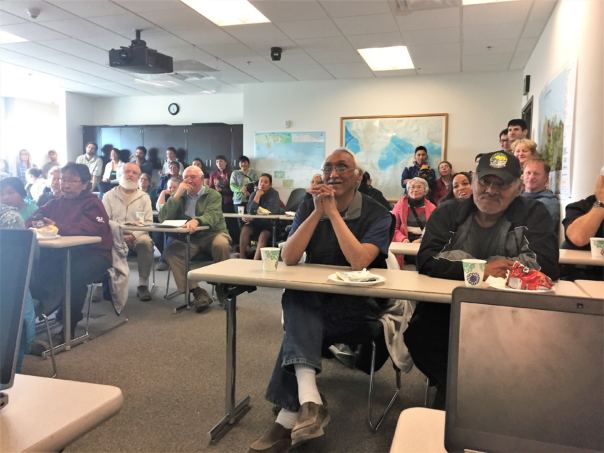
There’s a lot of science that happens on the North Slope. Some of it’s homegrown, like the wildlife research done by the North Slope Borough. But a lot of it is done by scientists who spend weeks or months doing field work here before heading home.
So how does the community stay in the loop on the research being done in their own backyard?
Out on the edge of Utqiaġvik, people filter into the building that serves as the town’s science hub. Kids play on the floor, while adults chat over hamburgers and hot dogs. By the time the presentations get started, every seat is taken.
“Thank you all for coming to our first BARC-becue,” Kaare Erickson said. Erickson is the community science liaison for Ukpeaġvik Iñupiat Corporation (UIC) Science, the arm of the village corporation that works on science logistics. “We call this building the BARC — it’s the Barrow Arctic Research Center… we’re just starting the BARC-becue series.”
Erickson grew up mostly in Unalakleet but his mom is from Utqiaġvik. Basically his job is to represent North Slope residents to the scientists who work up here, and vice versa.
In addition to food, there are also presentations from scientists who are trying to better understand some of the natural processes that affect climate by studying things like clouds and vegetation.
Fifty or so people showed up to the event, including Emma Kignak, who goes by Susie.
“I wanted to hear what was going on with the global warming,” Kignak said.
Kignak says that she’s seeing the effects of that warming with her own eyes, like changes in the sea ice. She came to this talk because she wants to understand why those changes are happening, and what might happen in the future. For example, she’s concerned about the warming of the permafrost that her town is built on.
“I always wonder… where are we going to go if all of a sudden the ice melt[s] and we all sink in?” Kignak said.
Leanna Mack is another resident who turned out for the event. She says she likes to keep tabs on the science being done in her hometown; it’s something she’s naturally curious about.
“I’ve been interested in science myself,” Mack said. “And growing up, my grandmother — she translated for National Science Foundation.”
Mack says she was a little surprised that so many people came to the talk because it is a drive, albeit a short one, from the main town. But she also said it makes sense, given this community’s long history with research.
“A lot of people in the community have been engaged in all the science that’s been going on up here for like 30, 40 years already,” Mack said. “And so I think that’s why there are so many people who do come out here, especially older people, because they were involved in it when they were little as well.”
Throughout the summer, Kaare Erickson will be organizing several other science outreach events.
Though Erickson is an employee of UIC Science, about half of his work is funded by the National Science Foundation, which sponsors a lot of North Slope research.
Erickson says that some researchers are more invested in outreach than others, and he’s glad when he encounters people who want to engage with the public. Presentations like those at the BARC-becue do help the community stay informed about the science that’s happening in their home.
But Erickson also wants researchers to take a second look at when in the research process that outreach happens.
“Does it come at the very end when you’re all done with the research when you come back and share the knowledge?” Erickson said. “Or does it come in the middle where you’re doing the research so that some of that traditional knowledge might be incorporated into your results? Or does it come in the very beginning when you’re planting the seeds and creating the research questions?”
In the future, Erickson hopes that things will shift more toward the last.




